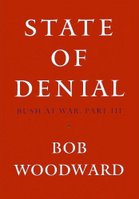 Did fault lie with the Bush administration’s incompetent handling of the Iraq war, and the almost 3,000 members of the U.S. military who have died (so far) during that region-upsetting conflict? Should blame be ascribed, instead, to the prez’s too little, too late approach to Hurricane Katrina in August 2005? Did voters simply lose the last of their already dwindling trust in George W. Bush after the White House’s warrantless domestic spying scandal, or maybe after Bush--who’d previously chided officials for releasing government secrets--himself endorsed the selective leaking of classified intelligence information from a “National Intelligence Estimate” on Iraq to New York Times reporter back in 2003? Or was the tipping point provided by the sex and corruption scandals that have embroiled the GOP over the last few months?
Did fault lie with the Bush administration’s incompetent handling of the Iraq war, and the almost 3,000 members of the U.S. military who have died (so far) during that region-upsetting conflict? Should blame be ascribed, instead, to the prez’s too little, too late approach to Hurricane Katrina in August 2005? Did voters simply lose the last of their already dwindling trust in George W. Bush after the White House’s warrantless domestic spying scandal, or maybe after Bush--who’d previously chided officials for releasing government secrets--himself endorsed the selective leaking of classified intelligence information from a “National Intelligence Estimate” on Iraq to New York Times reporter back in 2003? Or was the tipping point provided by the sex and corruption scandals that have embroiled the GOP over the last few months?Actually, as Salon editor Joan Walsh writes today, the failure of Bush’s party this election cycle might have been ensured by none of those factors:
Long after all the votes are tallied, the election-spending totaled up, the ads rated, the exit polls examined, I think we’ll find that the most crucial election-season event this year was the publication of Bob Woodward's “State of Denial.” I’m not going to debate Woodward’s journalistic shortcomings--my friends Sidney Blumenthal and Arianna Huffington have done a great job of that. Of course it must be said that the picture of the Bush administration that Woodward shatters--a decisive Bush, a sober, experienced Dick Cheney, an innovative, risk-taking Rumsfeld--was in fact a portrait heavily of his own creation, in his previous books “Bush at War” and “Plan of Attack.” Yet history could eventually absolve Woodward for those sins because he ultimately laid bare both the administration’s dissembling and its incompetence in executing this awful war.If only Woodward had brought forth his latest portrayal of a negligent, self-deceiving, and war-torn White House two years ago, before the 2004 presidential race, the country might not have had to endure the loss of international credibility and moral righteousness, and the deepening of domestic political divisions that have marked the second Bush administration. But better late than never, I guess.
Reading “State of Denial” was unexpectedly disturbing for me. It made me realize that the only thing worse than my angry liberal bubble (in which I’d assumed that Bush, Rumsfeld, Cheney, Colin Powell and Condoleezza Rice either didn’t know or didn’t care about the chaos in Iraq) was learning that in fact some of them did know, a few of them even cared--and they still couldn’t make a difference in stabilizing the country or fighting the insurgency. Watching Powell and Richard Armitage, and then to a lesser degree Rice and Stephen Hadley, try to challenge Rumsfeld’s iron grip on Iraq, and on Bush’s perception of it, was incredibly depressing. It was another Hurricane Katrina moment--if Katrina showed their incompetence domestically, “State of Denial” documented it in Iraq, and the consequences have been even deadlier. This week brought even more confirmation that victory, or even “peace with honor,” is virtually impossible in Iraq, with the news that Prime Minister Nouri al-Maliki ordered U.S. troops out of Sadr City, where they were seeking a missing U.S. soldier. It puts the lie to Bush’s simplistic formulation “As the Iraqis stand up, we will stand down.” Maliki is standing up, the United States is having to stand down while its soldiers are still in danger, and the odds are looking good that in the end we’ll find that we exchanged a Sunni tyrant for a Shiite.
READ MORE: “Rumsfeld’s Lethal Denial,” by Jason Leopold (TruthOut); “How Bush Deceived Public on Iraq,” by Bob Woodward (Newsweek).







No comments:
Post a Comment